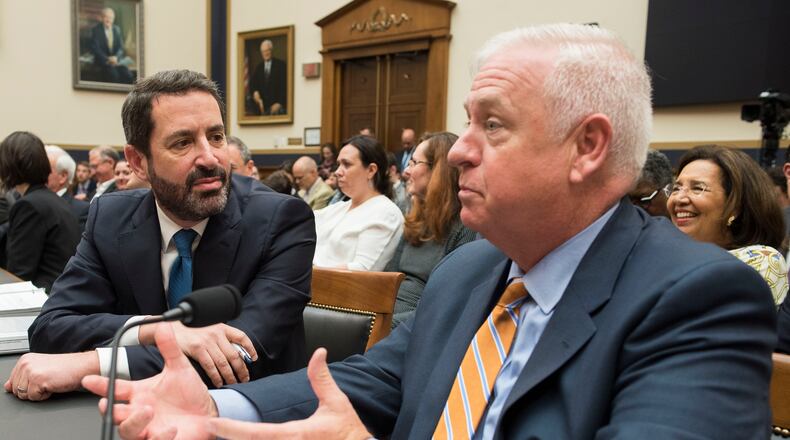News industry officials, including Atlanta Journal-Constitution Editor Kevin Riley, testified Tuesday on Capitol Hill in favor of legislation they say would help recover advertising revenue lost in recent years to tech behemoths such as Google and Facebook.
The group urged lawmakers on a House antitrust subcommittee to pass the Journalism Competition and Preservation Act. The bipartisan bill would provide a four-year reprieve from federal antitrust laws, allowing print and digital publishers to collectively bargain with tech companies about how their content is used — and what share of ad dollars they'll receive.
The head of the News Media Alliance, a trade association representing more than 2,000 newspapers and online outlets including the AJC, said Facebook and Google exert an “extreme level of control” over news outlets and that Congress needs to step in.
“These tech giants use secret, unpredictable algorithms to determine how and even whether content is delivered to readers,” David Chavern told a packed hearing room. “They scrape news organizations’ content and use it to their own ends, without permission or remuneration for the companies that generated the content in the first place.”
A Facebook spokeswoman later denied that the company scrapes content and said it works with publishers to determine how readers can access stories on the social media site.
“When an article is shared on Facebook — whether by a consumer or a publisher — access to that content will depend on whether and how the publisher has decided to make that article available,” the spokeswoman said.
Google and Facebook together rake in nearly three-quarters of online ad revenue, according to a recent study from the research group Pivotal.
Federal antitrust laws bar news organizations from banding together to negotiate more favorable terms from social media and search sites. And individual outlets are deterred from acting alone, according to Chavern’s group, because large tech companies could tank a news organization’s traffic by demoting or excluding its stories from searches.
The bill’s proponents say it could help turn the tide for an industry that’s been harmed over the past two decades by declining print subscriptions and ad revenue streams that have dried up and increasingly headed online.
As tech sites’ share of advertising revenue has grown — Google’s skyrocketed from $3.8 billion in 2005 to $52.4 billion in 2017 — U.S. newspapers have watched their’s nosedive from more than $49 billion to $16.5 billion during the same 12-year period, according to the Pew Research Center.
Riley highlighted some of the newspaper's most high-impact work over the past several years, including its coverage of the Atlanta Public Schools cheating scandal and a national investigation of doctors and sex abuse, which was a finalist for a Pulitzer Prize.
"If others repackage our journalism and make money off it, yet none of that money makes its way back to the local paper, then it makes breaking that next story or exposing the next scandal more challenging," Riley stated in his written testimony. "If that cycle continues indefinitely, quality local journalism will slowly wither and eventually cease to exist."
A trade group representing Facebook and Google said the bill would harm consumers, raise prices and slow innovation by allowing competing news organizations to “collude” with one another.
Matt Schruers, the vice president of law and policy for the Computer and Communications Industry Association, said tech companies have helped news sites grow their digital audiences to the tune of 10 billion viewers a month.
“Many publishers have embraced the internet using technology to better engage their audiences,” Schruers said.
Other critics have said the burden is on news organizations to find ways to adjust to the new online landscape.
The bill has attracted support from conservatives and liberals alike as Congress has increasingly set its sights on the business practices of Silicon Valley tech companies. U.S. Rep. Doug Collins, R-Gainesville, is a co-sponsor of the measure with Rhode Island Democratic U.S. Rep. David Cicilline.
“It does not propose any new regulatory structures. It does not threaten to break up any company,” said Collins, whose northeast Georgia district is ranked among the country’s most conservative. “It does promise to simply and effectively solve a problem.”
A companion bill has been introduced in the Senate and is being backed by presidential contender Amy Klobuchar, D-Minn., and Louisiana Republican John Kennedy.
> RELATED: Read Kevin Riley's presentation to the Congressional subcommittee
About the Author
Keep Reading
The Latest
Featured


